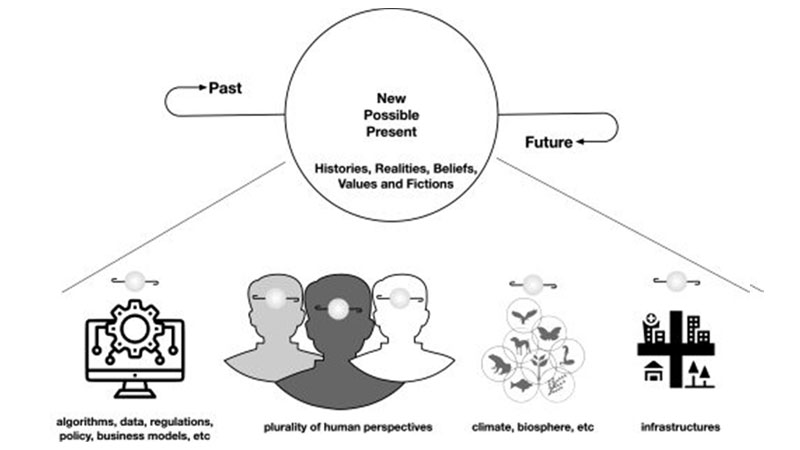What do our potential futures hold in store? How can we ensure that society is able to tackle the problems facing the next generations? This course takes creative processes developed by design and applies them to important present and future global challenges. You’ll develop the skills to draw stakeholders together and bring more-than-human and systemic forward thinking to any professional role.
Why Lancaster?
- Work with cutting-edge researchers on live briefs in our award-winning research centre, Imagination Lancaster
- Immerse yourself in future-led approaches to complex challenges by developing a creative and critical skillset that will stand out from the crowd
- Network with visiting professionals from the international design industry, and hear their thinking on the industry-leading, design practices of tomorrow
- Study futures focussed design theory and practice from different perspectives, and delve deeper into the areas that interest you the most
- Take part in collaborative learning, engaging with students and academics from a range of professional and academic backgrounds
Re-designing Futures
The MA in Design Futures focuses on addressing significant emergent issues related to society, digitalisation, products, places and environments, using future-oriented, practice-based approaches.
You’ll explore innovative methods, theories and practices that can be applied to a range of unfolding design research challenges, such as:
- Emerging technologies
- Sustainability
- Living environments
- Speculative design for heath and wellbeing
- Workplaces
- Transport Policy and governance
- Service design in the age of AI
You may explore historical views of how people thought about the future and how those ideas influenced today’s reality, such as the Internet of Things for sustainability, service design in the age of AI, co-design for communities, and speculative design for health systems.
You could immerse yourself in experiential futures creating plausible design fiction objects brought back from an impending world you have designed.
You might be asked for example to explore the possibility of a Mars colony in 100 years. How would you design a way to live in that environment? How do we make products, services, and even policies for such a future?
Much of the course is done through studio practice using methods such as forecasting and speculative design, where you will challenge norms, push boundaries and explore what that means for societies going forward.
Imagination Lancaster
Imagination Lancaster is an open and exploratory, design-led research centre, and one of the largest in the world. Our academic researchers are leaders in the field of futures, and they include designers, architects, engineers, technologists and more. Imagination Lancaster fundamentally informs our design courses including the MA in Design Futures, allowing you to learn directly from current research within design.
During studio practice modules, you will utilise our Imagination Lab. This is a creative workshop space, where you can put your ideas into practice through products, spaces and systems, while collaborating with our experts. You will have access to dedicated studios, seminar spaces and group study areas that encourage collaboration, as well as an equipment store and a team of technicians to support your creative work.
Futureproof your Skills
Throughout the course you will be developing professional skills such as how to navigate complex ideas, integrate concepts, facilitate thinking and visualize the intangible.
This means that you will graduate with a comprehensive skillset combined with an understanding of the importance of forward-faced thinking within design. You’ll be equipped to put this into practice in roles that include research, prototyping, project management and strategy building.
Whether you have a background in practice-based design or you are moving on to this master’s from an undergraduate degree in a related subject, to get the most from the course you’ll need to bring curiosity, creativity and a collaborative mindset. You may want to move into a role in an emerging, innovative area of design, or gain skills and knowledge to open new avenues and advance your career in your chosen field. This course supports both pathways, and gives you the freedom to explore and build on your personal interests and skillset.


